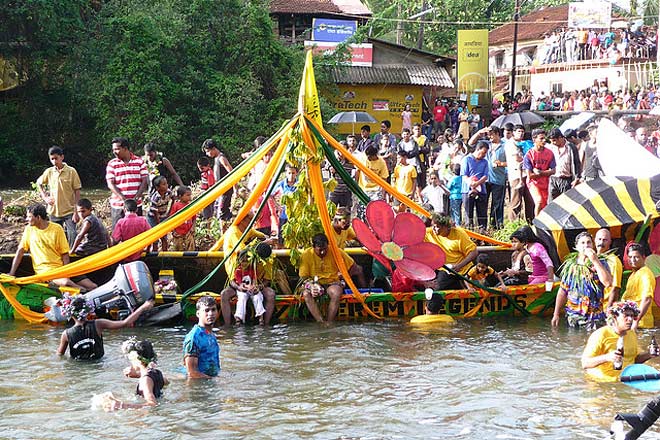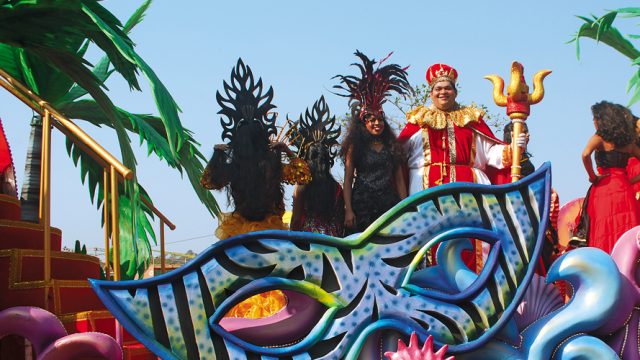Sao Joao If a Bacchanalian carnival full of inebriated
When: June 24
Where: Siolim

Sangodd
When: June 29
Where: All around Goa
A festival celebrated very keenly by Goa’s fishing community; it marks the feasts of Saints Peter and Paul. The fishermen spend their morning partaking of their religious services and then the Sangodd celebrations begin. The celebration involves binding two or more boats together to form a makeshift platform to support miniature models of churches and chapels which are then carried along the course of the Cumbarjua canal. A bamboo pole with an image of St. Peter attached to it is also erected on the makeshift float. The boats make seven rounds of the canal, accompanied by raucous cheers and chants of “Viva St.Pedro!” and dances by colourfully attired fishermen. The celebrations culminate at the chapel of St. Peter which is located downstream and the day is rounded off with a cultural programme organised in the evening.

Chikal Kalo
When: End of July
Where: Marcel
If you loved mud fights as a kid and you secretly wish to rewind the clock for that very reason, then the Chikal Kalo festival is tailor-made for you. Chikal Kalo literally means ‘play in the mud’ and nobody knows about the origins of the festival but it is said to be over 150 years old. Marcel, the town where the celebrations take place, holds the distinction of having the only Devki-Balkrishna temple in India. The day starts off with a round of bhajans at the Devki-Balkrishna temple, this is followed by generous distribution of oil to all the willing participants of the mud-play. Thereafter, the grand event commences. The beating of drums, bells and cymbals echo as the participants indulge in all sorts of mud games, ensuring each one is thoroughly bathed in mud by the end of it. Even if it is the kind of thing you’ve never done before, the celebrations can delight anyone in the mood for gambolling in a playground of mud minus the disapproving looks. The festival concludes with the customary breaking of a suspended ‘dahi-ka-handi’ by a human pyramid.
Touxeachem Fest
When: July 29
Where: Talaulim in Tiswadi Taluka
The Touxeachem Fest, which literally translates into the cucumber fest, is an unusual festival celebrated annually in Talaulim. The festival draws people from all over Goa, especially a large number of newly-weds who come here to seek the divine blessings of St. Anne who herself was blessed with a child after 40 barren years. Mind you, the length of the queues can be quite mind-boggling and some of them continue till evening. The devotees thronging the 450-year-old church normally show up with two cucumbers, one which they leave at the feet of the statue and other which is taken back after invoking her blessings. Following the centuries old tradition, childless couples show up and offer a prayer ‘Senhora, tomai pepino, dai me menino’, which translates to ‘lady, take this cucumber and bless me with a child’. Bachelors seeking wives offer spoons and spinsters seeking husbands offer lentils. Unlike a lot of other Christian festivals this one is also attended by a large number of Hindu devotees who turn up to pay their respects to St. Anne.

Patolleanchem Feast
When: August 15
Where: Socorro village
If you have a sweet-tooth, this Goan festival should be high on your bucket list. August 15, apart from being Independence Day, is also the date for the Goan festival of Patolleanchem. Famed for its mouth-watering patolleo—a sweet dish made primarily out of rice, coconut and jaggery, it continues to be a rage amongst the locals. The feast which is blessed by the parish priest Father Santana Carvalho is organised to commemorate the assumption of Mother Mary to Heaven. Visit the festival for the sweet Goan delicacy and also use the opportunity to check out the local handicrafts of the regions which are on display throughout the day.

Bonderam
When: 3rd or 4th Saturday in August
Where: Divar Island
Have you ever witnessed a comic mock-fight between two rival groups in which berries and toys made out of bamboo stems are used as projectiles to knock down a bunch of flags? Well, here’s your chance. The Bonderam Festival is a throwback to the days of hostility between the wards of a village during the Portuguese era which often resulted in bloodshed. The Portuguese attempts to control the conflict never succeeded completely as the flags they would use to demarcate the divided territory were knocked down quite frequently, an act the festival makes light of. The festival takes place on the island of Divar, which is 12 km from the capital city of Panjim. The parade is marked by enthusiastic crowds sporting brightly coloured costumes and blaring music. The bamboo stem toys which the participants use in the fight are called ‘fotashes’ and although this is viewed as an elaborate mockery, the villages leave no stone unturned at outdoing each other while parading their floats through the crowd of onlookers.
Goa
Goa in the monsoons
Monsoon festivals in Goa



